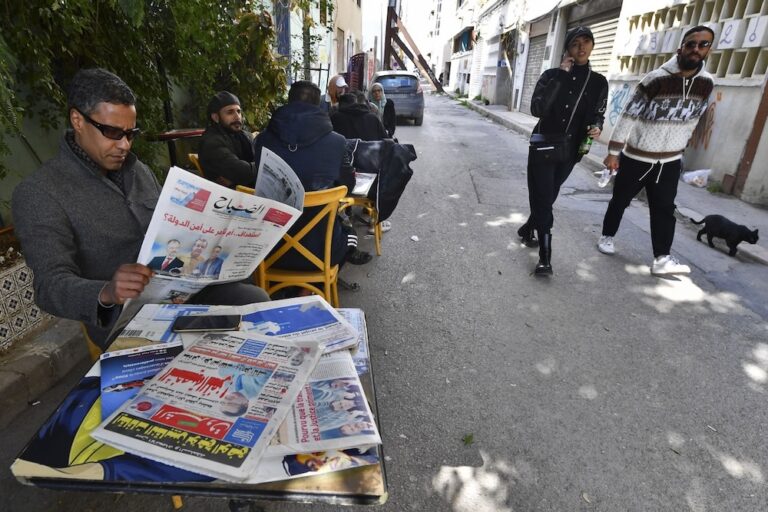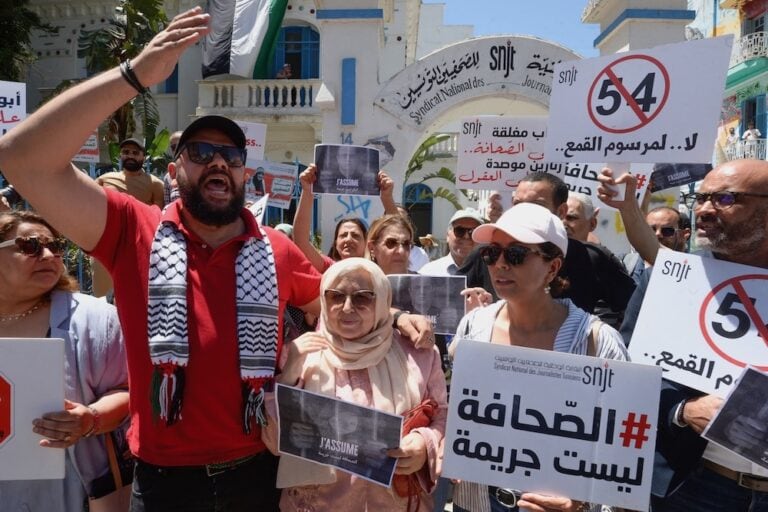Zied El Heni, the president of the National Union of Tunisian Journalists (SNJT), was freed on September 16 after three days in detention. Bail was demanded for his release and all charges against him have not been withdrawn.
Reporters Without Borders is relieved that Zied El Heni, the president of the National Union of Tunisian Journalists (SNJT), was freed on September 16 after three days in detention, but regrets that bail was demanded for his release and calls for the withdrawal of all the charges against him.
After being summoned before a judge in the Tunis district of Bab Bnet on 13 September, Heni was arrested for accusing the public prosecutor of fabricating evidence to justify Astrolab TV cameraman Mourad Meherzi’s arrest for filming an egg being thrown at culture minister Mehdi Mabrouk.
Amid angry protests from his lawyers and a major police presence outside the court, Heni was transferred to Monarguia prison, where he remained in pre-trial detention until bail of 2,000 dinars (about 1,000 euros) was paid after being raised by contributions from members of the public outside the Ban Bnet court. His trial is due to start on 24 September.
The charges against Heni stem from a live interview he gave to Nessma TV on 28 August, in which he displayed a copy of official report showing that, contrary to the public prosecutor’s claims, Meherzi refused to sign a document confessing to complicity with Nasreddine Shili, the filmmaker who threw the egg at the culture minister.
The judge ordered Heni held on 13 September under article 128 of the criminal code. According to this article, a sentence of two years in prison and a fine of 120 dinars (60 euros) can be passed on “anyone who, in a public address, in the media or by other means of publicity, makes accusations against a public official or accuses him of illegal activities in connection with his work, without establishing the truth of these allegations.”
“Placing Zied El Heni in pre-trial detention was completely unjustified and was done with the aim of silencing criticism of the proceedings against Mourad Meherzi,” Reporters Without Borders said. “There has been disturbing increase in prosecutions of journalists and public figures, and this just took the already considerable tension up another notch.”
“As if by chance, the prosecutor responsible for the charges against Shili and Meherzi and the complaint against Heni has just been awarded a major promotion within the Court of Cassation, Tunisia’s highest court. His zeal has clearly been rewarded. Those who defend media freedom will inevitably see this as a provocation.”
In a separate development, a complaint brought on behalf of the president against Express FM journalist Zouhair El Jiss in connection with a March interview with Lebanese political commentator Salam Zahran was finally withdrawn on the morning of 13 September. The president’s defamation suit against Zahran nonetheless still stands.
Jiss was released after appearing before a judge on 13 September but a new judicial summons is still pending. Reporters Without Borders urges the judge to respond appropriately to the complaint’s withdrawal by dismissing all the proceedings against Jiss.
The case constitutes yet another example of the way judicial procedure is abused when politicians and public figures want to intimidate journalists. Jiss is still facing charges under:
- Article 128 of the criminal code (the one being used against Heni).
- Article 86 of the telecommunications law, under which “knowingly causing prejudice to another person or disturbing their peace via the public telecommunications networks is punishable by imprisonment for one to two years and a fine of 100 to 1,000 dinars.”
- Article 57 of Decree-Law No. 115 on media freedom, under which “any form of attack on the dignity of another person, term of contempt or insult not involving a specific allegation” is punishable by a fine of 500 to 1,000 dinars.
“This prosecution of both Jiss and his guest, who made serious allegations against the president during the interview, is very similar to the prosecution of Meherzi, who is due to appear before a judge on 23 September,” Reporters Without Borders said.
Reporters Without Borders reminds Tunisians that:
- Freedom of information constitutes one of the foundations of a democracy.
- The exclusive character of Tunisia’s press law must be accepted. Reference must be made its articles and its articles alone when trying media cases.
- Articles in the criminal code or other laws that conflict with the articles of the new press law are no longer valid. This is established in article 79 of the press law, which repeals “all previous legal provisions that conflict with this law, from the date that it takes effect.”
- The criminal code must be revised and amended in order to bring it into compliance with international standards.
- As public figures, government officials must accept media coverage of the public events in which they take part, and must accept criticism.
- Judges must act as guarantors of the judicial system’s independence and must heed international standards, especially as regards defamation, so that a balance can be found between the individual’s right to dignity and privacy on the one hand, and freedom of expression on the other, above all in connection with public figures and matters of public interest.
Reporters Without Borders declares its support for the National Union of Tunisian Journalists, which has called for a strike by all the media on September 17 in protest against judicial harassment of journalists.


